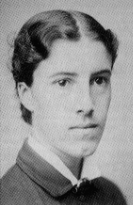
|
.
|
http://www.kirjasto.sci.fi/gilman.htm Gilman Society Website | http://www.cortland.edu/gilman/ Charlotte Perkins Gilman American writer, economist, and lecturer, an early theorist of the feminist movement, who wrote over two hundred short stories and some ten novels. Gilman refused to call herself a "feminist" - her goal as a humanist was to campaign for the cause of women's suffrage. Gilman saw that the domestic environment has become an institution which oppresses women. Her famous story, 'The Yellow Wallpaper' (1892), depicted a depressed woman who slowly descends into madness in her room while her well-meaning husband is often away due to his work at a hospital. American writer, economist, and lecturer, an early theorist of the feminist movement, who wrote over two hundred short stories and some ten novels. Gilman refused to call herself a "feminist" - her goal as a humanist was to campaign for the cause of women's suffrage. Gilman saw that the domestic environment has become an institution which oppresses women. Her famous story, 'The Yellow Wallpaper' (1892), depicted a depressed woman who slowly descends into madness in her room while her well-meaning husband is often away due to his work at a hospital. Gilman's best-known work is WOMEN AND ECONOMICS (1898), in which she attacked the old division of social roles. According to Gilman, male aggressiveness and maternal roles of women are artificial and not necessary for survival any more. "There is no female mind. The brain is not an organ of sex. As well speak of a female liver." (from Woman and Economics, 1898) Only economic independence could bring true freedom for women and make them equal partners to their husbands. In CONCERNING CHILDREN (1900) Gilman advocated professional child-care. <center> HERLANDby Charlotte Perkins Stetson Gilman 1860-1935CHAPTER 1 A Not Unnatural Enterprise </center> This is written from memory, unfortunately. If I could have brought with me the material I so carefully prepared, this would be a very different story. Whole books full of notes, carefully copied records, firsthand descriptions, and the pictures--that's the worst loss. We had some bird's-eyes of the cities and parks; a lot of lovely views of streets, of buildings, outside and in, and some of those gorgeous gardens, and, most important of all, of the women themselves. Nobody will ever believe how they looked. Descriptions aren't any good when it comes to women, and I never was good at descriptions anyhow. But it's got to be done somehow; the rest of the world needs to know about that country. I haven't said where it was for fear some self-appointed missionaries, or traders, or land-greedy expansionists, will take it upon themselves to push in. They will not be wanted, I can tell them that, and will fare worse than we did if they do find it. It began this way. There were three of us, classmates and friends--Terry O. Nicholson (we used to call him the Old Nick, with good reason), Jeff Margrave, and I, Vandyck Jennings. We had known each other years and years, and in spite of our differences we had a good deal in common. All of us were interested in science. Terry was rich enough to do as he pleased. His great aim was exploration. He used to make all kinds of a row because there was nothing left to explore now, only patchwork and filling in, he said. He filled in well enough--he had a lot of talents--great on mechanics and electricity. Had all kinds of boats and motorcars, and was one of the best of our airmen. We never could have done the thing at all without Terry. |